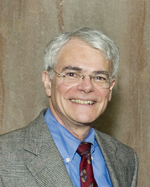From the Deputy Director for Intramural Research
For Our Fellows At the NIH

Over the past 30 years, NIH intramural science has become increasingly dependent on talented postdoctoral fellows to conduct most of the innovative research done in our laboratories and to help with the training of our growing cadre of predoctoral students. In turn, NIH principal investigators (PIs) and NIH leadership have sought ways to ensure that the training experience here for fellows is among the best in the world. We are also working on new initiatives to improve that experience.
I want to take this opportunity to thank our nearly 4,000 fellows, including IRTAs (Intramural Research Training Awards recipients) and CRTAs (Cancer Research Training Awards recipients), visiting fellows, and research and clinical fellows for their contributions to NIH research, and summarize why I think we provide one of the best environments anywhere for training and career development.
The primary goal of fellows is to work in laboratories that are doing cutting-edge research in which they can make contributions that will advance their careers.
By any quantitative standard, including publication rates, citations, technology transfer into marketed products, and recognition with prestigious awards and memberships in honorific societies, NIH intramural research and researchers are among the best of any institution in the country. Working as a fellow in an NIH lab is surely a world-class opportunity.
Our PIs are also aware of the importance of mentoring and advocating for their fellows. Consequently, the success rate for finding jobs after an NIH fellowship is very high. Fellows find jobs in industry, government, and academic centers as well as in many science-related fields that may not involve bench research.
Here at NIH, former NIH fellows and students occupy approximately 30 percent of our PI positions, a statistic that is consistent with the quality of both the fellows and their training here in a very competitive environment.
The NIH Intramural Program has very active training directors and training programs within each institute and center. In addition, the Office of Intramural Training and Education, led by Sharon Milgram in the Office of Intramural Research, provides world-class coursework, counseling, and outreach activities to ensure a talented and diverse postdoctoral population at the NIH.
NIH provides many benefits to fellows including a premier health-insurance program managed by the Foundation for Advanced Education in the Sciences, availability of childcare services, Transhare Program benefits to encourage use of public transportation and reduce its cost, and stipends that are competitive with those offered at other premier academic institutions.
More recently, we have been working on two new initiatives for improving the quality of life for fellows at the NIH that parallel improvements for our NIH employee workforce: increased flexibility in work hours and backup daycare.
When I speak to fellows, it is clear that increased flexibility to allow them to manage home life and work life is extremely important. One of the new initiatives is a program that we are calling “Keep the Thread” that would allow IRTA and CRTA fellows, with agreement of their PIs and scientific directors, to take some time off to attend to personal responsibilities during their fellowship or take advantage of flexible hours to conduct their research. Please contact your PI and scientific director to discuss whether you would be eligible for this program.
The other new initiative is a backup daycare program for fellows (and NIH employees) whose regular daycare is not available and they have a short-term need for licensed caregivers either in the home or at another daycare center. For more information on backup care, visit http://www.ors.od.nih.gov/pes/dats/childcare/Pages/NIHBack-upCareProgram.aspx.
I am grateful to the scientific directors and the many individuals at NIH, including the Fellows Committee, who have been consistent, forcible, and convincing proponents for our NIH Fellows.
Any additional ideas you might have to improve the environment for our fellows are always welcome.
This page was last updated on Monday, May 2, 2022
